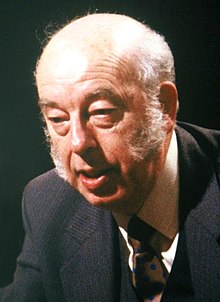|
Rhodes Boyson
Sir Rhodes Boyson (11 May 1925 – 28 August 2012) was an English educator, author and Conservative Party politician who served as Member of Parliament for Brent North. He was knighted and made a member of the Privy Council in 1987. Early lifeBorn in Haslingden, Lancashire, England, the son of cotton-spinner and Alderman William Boyson MBE JP, and his wife Bertha,[1] Rhodes Boyson was educated at Haslingden Grammar School, University College Cardiff, the University of Manchester, the London School of Economics, and Corpus Christi College, Cambridge. He was awarded a PhD in 1967 by London University, his thesis being on Henry Ashworth, a Victorian Lancashire cotton manufacturer, brother-in-law of Richard Cobden, and a Radical campaigner who also had a reputation as a model employer. It was published in 1970 by Oxford University Press as The Ashworth Cotton Enterprise. The Rise and Fall of a Factory Firm. 1818–1880.[2] Early careerCalled up towards the end of the Second World War, Boyson served with the Royal Navy, based in India at the time of Independence, and from his late 20s, he was a Methodist lay preacher. He became a teacher in 1950, and later a head teacher, first at Lea Bank Secondary Modern School in Cloughfold, Rossendale (1955–61), then at Robert Montefiore Secondary School, Stepney, London (1961–66),[3] and finally from 1967 to 1974 at Highbury Grove School, a new all-boys' comprehensive in Islington, North London, of which he was the founding head teacher; in this capacity, and subsequently as an MP, he was outspoken in support of the retention of corporal punishment in British schools. He opposed what he perceived to be lax discipline, both in modern education and in the wider society, and at Highbury Grove he introduced an unfashionably traditional regime, with strictly enforced uniforms, caning for misbehaviour, and a house system. He said that this proved so popular with local parents that the school was consistently oversubscribed.[4] From 1957 to 1961, Boyson was a Labour councillor in Haslingden, where his father was at that time a Labour alderman and had been a trade union secretary. His father was a cotton spinner, and had been imprisoned as a conscientious objector in the First World War. Boyson left the Labour Party in 1964, joining the Conservative Party three years later.[5] He later wrote:
In 1977, he was co-author (with Brian Cox) of one of the series of Black Papers on education,[7] criticising many aspects of the comprehensive schools system. Boyson was a severe critic of what he regarded as the influence of "mindless sociologists" who produced "mush which has corrupted the national character", noting in 1978 that "it has not gone unnoticed that crime has increased parallel with the number of social workers". The Daily Mirror responded with an editorial comment "that crime has also increased parallel with speeches from Dr. Boyson".[8] He served as chairman of the National Council for Educational Standards. Parliamentary career Having stood unsuccessfully at Eccles in 1970, Boyson was first elected to the House of Commons in February 1974 for Brent North, and was Parliamentary Under-Secretary at the Department of Education and Science 1979–1983. In this capacity he sought to uphold schools' right to use the cane, and was nicknamed the "Minister for Flogging" by the anti-corporal-punishment campaign STOPP.[citation needed] He was Minister of State for Social Security 1983–1984, for Northern Ireland 1984–1986 and for Local Government 1986–1987. Boyson was a strong opponent of homosexuality,[9] and a supporter of Section 28. He said:
Boyson was a supporter of the Conservative Monday Club and frequently addressed them.[11] At the Conservative Party Annual Conference at Blackpool on 10 October 1991 he was the principal speaker at a Club fringe meeting on the subject of A Conservative Revolution in Education. In 1994, he appeared on the BBC topical panel TV show Have I Got News for You. He also appeared on Brass Eye[12] and was an early interviewee of Ali G.[13] Boyson lost his Brent North seat in the Labour landslide of 1997, his 24% majority turning to a 10% majority for the opposition, partly because of his perceived lack of commitment to the campaign to retain Edgware General Hospital;[citation needed] in 2001, the seat, no longer contested by Boyson, swung a further 9% to Labour. Personal lifeDistinctive personal features were his mutton chop whiskers and strong Lancashire accent. The whiskers dated from an occasion when he rebuked pupils for having long hair at the school where he was headmaster: the students retorted jokingly, "Why don't you grow your hair, Sir, if we cut ours."[14] In 2007, he received an honorary degree from the University of Buckingham.[15] Boyson married Violet Burletson in 1946, and they had two daughters. The couple divorced in 1971, after which he married Florette MacFarlane,[16] a teacher.[1] He and his second wife lived in Pinner, northwest London,[citation needed] until he moved into Cedar House nursing home in Harefield, where he died aged 87.[16] He left more than £2,000,000 in his will, the majority of it going to his widow.[17] She died in 2018.[18] References
Further reading
External links
|
||||||||||||||||||||||||||||||||||||||||||||||||||||||||||||||||||||||||||||||
